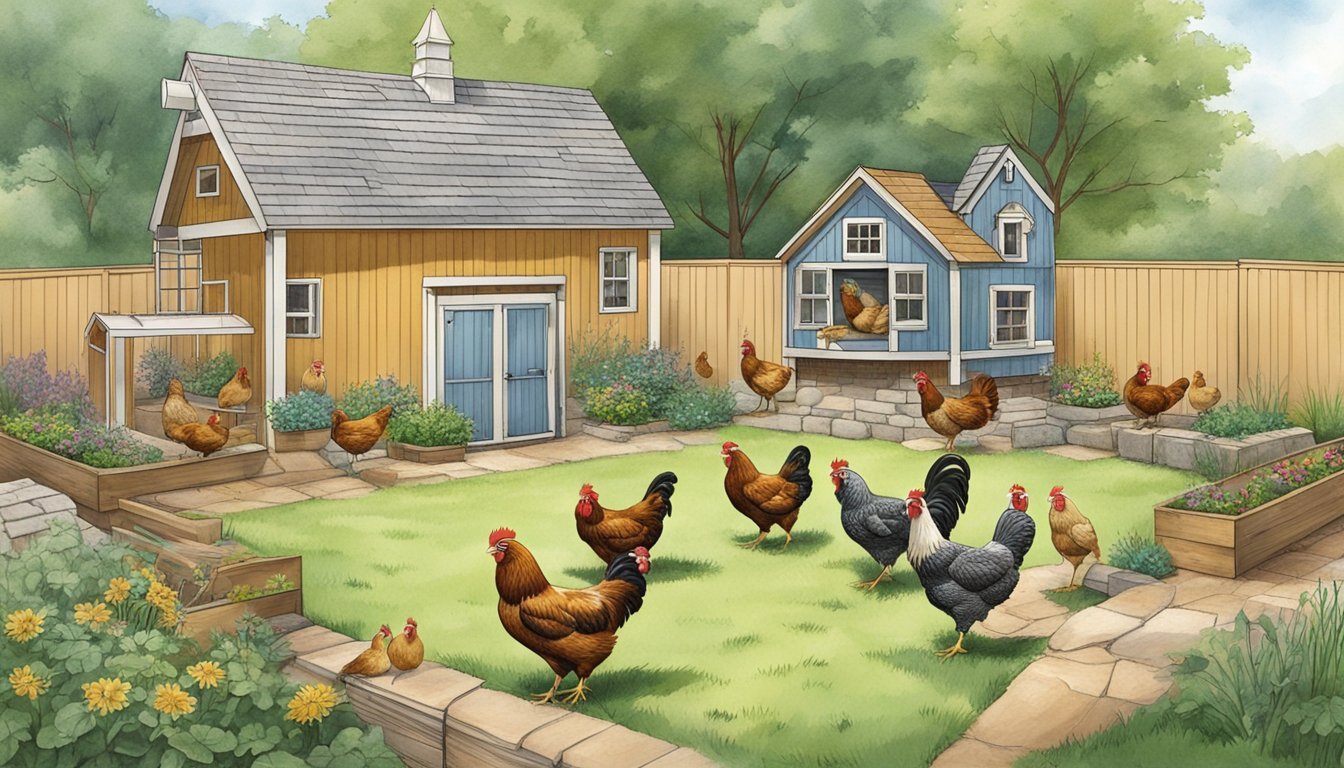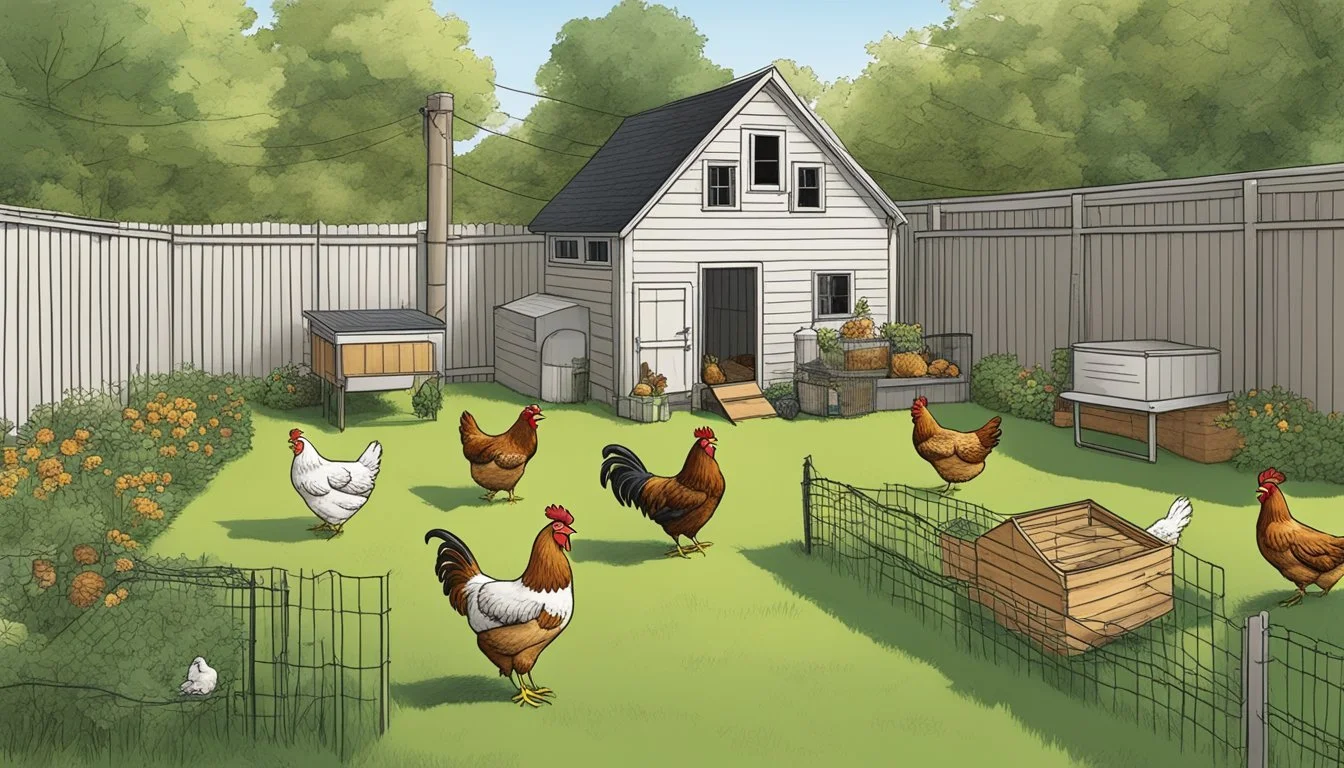Keeping Backyard Chickens in Cedar Rapids, IA
Essential Guidelines for Beginners
Keeping backyard chickens has become an increasingly popular practice in urban areas across the United States, offering residents the opportunity to enjoy fresh eggs, natural garden pest control, and the pleasure of caring for these animals. Cedar Rapids, Iowa, is one city that encourages this trend by allowing the raising of chickens within its city limits. In accordance with the city's Urban Chicken Ordinance, residents have the opportunity to engage in small-scale poultry husbandry in a way that is compatible with the urban environment.
To maintain harmony with neighbors and ensure the health and safety of both chickens and the community, Cedar Rapids has set clear regulations. Residents who wish to keep chickens must secure an annual permit for a nominal fee, highlighting the city's structured approach to urban farming. The ordinance specifies that only hens are permitted, a rule aimed at minimizing noise since roosters are known for their early morning crowing. Furthermore, a set limit of six chickens ensures that flocks remain at a manageable size, reducing potential nuisances and maintaining the residential character of the city's neighborhoods.
By providing such detailed yet accessible guidelines, Cedar Rapids supports a sustainable lifestyle option for its citizens, balancing the joys of raising backyard chickens with responsible urban governance. The process for obtaining a permit is streamlined, illustrating the city's commitment to fostering an environment where local produce and residential wellbeing are harmoniously intertwined.
Understanding Cedar Rapids Chicken Ordinance
Residents of Cedar Rapids, Iowa, interested in keeping backyard chickens must adhere to specific regulations set forth by the city. The Urban Chicken Ordinance, encapsulated in Cedar Rapids Municipal Code Chapter 23A, outlines the requirements and restrictions for the practice within the city limits.
To keep chickens in Cedar Rapids:
Permit Requirement: Residents must obtain a permit, which is valid for one year, to raise, harbor, or keep hens.
Permit Fee: The cost of the annual permit is $25.00.
Number of Chickens: The number of hens allowed on any given property is restricted to a maximum of six (6).
Prohibited Fowl: Roosters are not permitted, minimizing noise disturbances for the community.
Here is a tabulated summary of key points:
Ordinance Feature Detail Location Cedar Rapids, Iowa Governing Code Chapter 23A Permit Validity 1 year Annual Permit Fee $25.00 Hen Limit Up to 6 hens Roosters Prohibited
The ordinance aims to balance the interests of urban chicken enthusiasts with that of the general community. It ensures that the practice of keeping backyard chickens does not interfere with neighbors' rights and public health.
Individuals should always verify the most recent information on the City of Cedar Rapids website or contact city officials, considering any legislation can be updated. Those interested are reminded to thoroughly review the complete Municipal Code and comply with all the local regulations.
Zoning and Location Regulations
Within Cedar Rapids, IA, specific zoning and location regulations govern the keeping of backyard chickens. These rules ensure that residents comply with local ordinances while fostering responsible urban agriculture.
Residential Zoning Requirements
In Cedar Rapids, only single-family dwelling properties are eligible for residents to raise, harbor, or keep hens. These residence types must adhere to the city’s Urban Chicken Ordinance.
Proximity to Neighbors and Dwellings
Keeping chickens requires careful consideration of their proximity to adjacent dwellings. Residents must maintain sufficient distance from neighbors to avoid nuisances, as prescribed by the Cedar Rapids Municipal Code.
Zoning Ordinance Compliance
Every Cedar Rapids resident interested in urban chicken farming must comply with Chapter 23A of the Urban Chicken Ordinance. It mandates acquiring a valid permit and upholding all related zoning laws for the maintenance of urban chickens.
Permissible Areas Within Cedar Rapids
The permission to raise chickens extends to different zoning districts identified by the city's zoning ordinance, with regulations focusing on maintaining the suburban and urban harmony within Cedar Rapids.
Updates and Changes to Zoning Laws
The City Council of Cedar Rapids reserves the right to amend the zoning laws, affecting how residents may keep backyard chickens. The community must stay informed about any alterations to remain compliant with the current legal framework.
Obtaining a Permit
Residents of Cedar Rapids interested in raising backyard chickens must adhere to specific municipal regulations, including securing a permit. This ensures the well-being of the chickens and maintains community standards.
Permit Application Process
Applicants seeking to keep chickens must obtain a permit through the Building Services Division. The process involves completing the requisite forms which are available at the City Services Center located at 500 15th Avenue SW. It is compulsory for applicants to inform all immediately adjacent dwellings of their intention to apply for the permit.
Annual Permit Fee and Renewal
An annual permit fee of $25.00 is mandated. Permit holders are expected to renew this permit annually and ensure that they are in compliance with the urban chicken regulations stipulated in Chapter 23A.
Educational Requirements for Owners
Prospective chicken keepers are required to undergo an approved class on how to raise chickens in an urban environment. This educational course is provided by the Indian Creek Nature Center and aims to equip owners with knowledge on proper chicken care and management.
Permit Regulations and Enforcement
The enforcement of the urban chicken keeping regulations falls under the jurisdiction of Cedar Rapids city officials. To hold a valid permit, the coop must meet standards for ventilation, be predator-resistant, and designed for ease of cleaning as outlined in the city's ordinances.
Coop Design and Maintenance
When keeping backyard chickens in Cedar Rapids, IA, coop design and maintenance are critical to poultry health and compliance with local ordinances. Coop structure must meet specific requirements, coops and runs need to be strategically located, and stringent cleaning and sanitation protocols must be followed.
Coop Structure Requirements
A well-designed coop is essential for protecting chickens from weather and predators. It should be well-ventilated to prevent respiratory issues and ammonia buildup. Each chicken requires at least four square feet of space within the coop to maintain good health and minimize stress. Coops must also meet the Cedar Rapids' prescribed standards, including sturdy construction to withstand Iowa's variable weather.
Proper Location for Coops and Runs
Coops and their adjacent runs should be located in a backyard area that minimizes noise and odor for neighbors. The location must provide enough space for the runs, allowing at least ten square feet per chicken. It is imperative to ensure that coops are not placed in front setback areas and observe any specific distance requirements from neighboring dwellings or property lines as defined by local regulations.
Cleaning and Sanitation Standards
Regular cleaning and sanitation are vital to prevent disease and maintain a healthy environment for backyard chickens. Coop floors should be lined with straw or wood shavings and changed frequently. Composting chicken waste is a sustainable practice that benefits garden soil; however, it must be managed to avoid attracting pests. All feeding and watering equipment should be cleaned regularly to prevent mold and buildup of waste.
Chicken Care and Management
Raising backyard chickens in Cedar Rapids requires adherence to specific guidelines to ensure the welfare of the chickens and compliance with local regulations. This section covers the types and limits of chickens allowed, health and safety measures, and daily feeding and maintenance practices.
Allowed Chicken Types and Limits
In Cedar Rapids, residents are permitted to keep hens, but not roosters, due to noise considerations. Restrictions are in place to maintain harmony within residential areas:
Maximum of six hens per tract of land.
No allowance for roosters to minimize noise disturbances.
Only female chickens (hens) are permitted.
These limitations help manage noise levels and ensure a peaceful environment for neighbors.
Health and Safety Considerations
Maintaining the health and safety of backyard chickens is crucial. Residents must keep their coops clean to prevent the spread of disease and to maintain a hygienic space for both the chickens and the community. Key health standards include:
Regular coop cleaning to prevent disease.
Secure enclosures to protect hens from predators and harsh weather.
Monitoring for signs of illness or distress in chickens for prompt treatment.
Providing a clean and safe environment is essential for the health of the hens and the safety of the neighborhood.
Feeding and Daily Maintenance
Proper feeding and day-to-day care are crucial for the vitality of backyard chickens. The diet should be tailored to the chickens' growth stage:
Chicks (0-8 weeks): Starter feed with 18-20% protein.
Young hens (8-14 weeks): Starter/grower feed with 16-18% protein.
Mature hens (15 weeks and older): 16% protein finisher or layer feed.
Daily maintenance tasks are important to ensure the chickens are healthy and the coop environment is clean. Consistent access to fresh water and the provision of adequate space for free movement are also important aspects of daily chicken care.
Responsibilities and Legal Compliance
Cedar Rapids residents must be aware of their duties and adhere strictly to city regulations when keeping backyard chickens. These rules are in place to ensure public health, animal welfare, and neighborhood harmony.
Adhering to City Ordinances
The City of Cedar Rapids has laid out specific ordinances governing the keeping of backyard chickens. Residents are required to obtain a valid permit, renewable annually, with a fee of $25. It's imperative that chicken coops meet the required standards, and homeowners must ensure that their chickens are raised, harbored, and kept within the confines of their property. Roosters are prohibited within city limits to prevent noise disturbances.
Restrictions on Slaughtering Chickens
The City has set strict boundaries regarding the slaughtering of chickens. To perform slaughtering activities, residents must follow relevant ordinances and be aware of humane procedures. The Indian Creek Nature Center is a resource that may offer guidance on this subject, but residents must seek detailed information on permissible practices and reportable offenses to stay compliant.
Handling Nuisance and Complaints
When it comes to handling nuisance and complaints, the welfare of neighbors and the surrounding community is of utmost importance. Noise from chickens must be kept to a minimum to avoid neighborhood disputes and potential legal issues. Homeowners should proactively manage their chickens to reduce any potential nuisance. If complaints arise, they are expected to address them swiftly within the framework of the city’s ordinances and strive for amicable solutions.
Community Interactions and Education
Keeping backyard chickens in Cedar Rapids isn't just about fresh eggs; it involves engaging with the community and educational growth. Residents are equipped with necessary information and guidelines, ensuring harmonious interactions with their neighbors and fostering a community of knowledgeable poultry keepers.
Engaging with Neighbors
When raising chickens within Cedar Rapids city limits, communication with neighbors is crucial. A resident intending to keep hens should inform their immediate neighbors about their plans. This open dialogue helps to address concerns such as noise and property upkeep. It's important for potential chicken keepers to understand that maintaining good neighborly relationships is key for a positive experience.
Educational Opportunities at Indian Creek Nature Center
The Indian Creek Nature Center offers invaluable resources for aspiring and current chicken owners. They provide a Backyard Chicken Workshop class, which is a requisite for those wishing to keep chickens. Through educational classes, residents learn about proper chicken care, local ordinances, and the benefits of sustainable living.
Benefits of Raising Chickens
Residents of Cedar Rapids who raise chickens enjoy several benefits. Fresh eggs are a significant advantage, with a taste and nutritional profile often superior to store-bought options. In addition, chickens contribute to sustainable living practices by composting kitchen scraps and providing natural fertilizer for gardens. These benefits also serve as excellent talking points when engaging with neighbors about the perks of chicken keeping.







